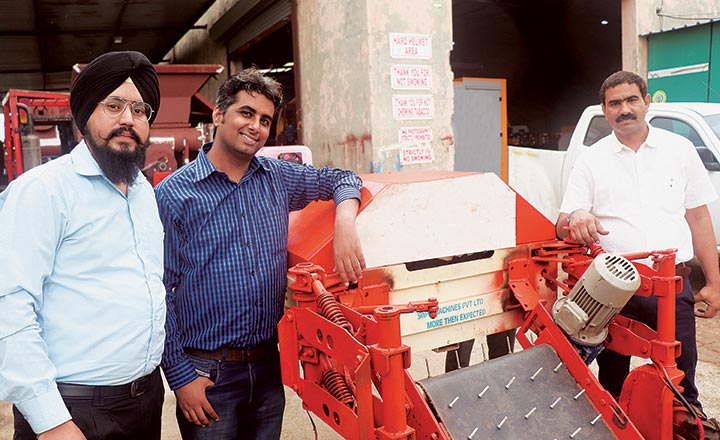“About 70% rice-growing farmers of north India tend to burn rice straw, instead of bundling and sending it away, to avoid heavy transportation charges,” says Varinder Singh, co-founder, Green Farming Forever (GFF) Innovations. This transportation cost can be anywhere between Rs.3,500 and Rs.5,000 for one acre of land, which produces around 3-4 tonne of rice straws. Most of the farmers of Punjab and Haryana own over 10 acres of land, according to Singh. For both the processes, the farmers have to dry the crops first, for at least seven days.
Hailing from rice-growing farming families, Varinder Singh and Nitin Saluja were aware of the difficulties faced by the farmers during harvesting season. Adding to that, burning of crops remains a major environmental concern. They met as students two-and-a-half years ago at Chitkara University in Chandigarh where this issue became the talking point of their canteen conversations, motivating them to find a solution to it.
Working in their lab was a comfort, but to build a proper machine they needed fund. “Nobody was ready to fund us at the initial stage. They didn’t believe in the idea,” Singh explains. He approached his friends Vilas Chhikara and Parvesh Chhikara of SnPC Machines, who decided to become their manufacturing partners without charging them a single penny. The ideation scaled up when Chitkara University later incubated and funded the team.
Soon, their machine, Moksh, was ready to be tested. The machine prototype could dry and powder the rice straws produced on an acre of land in an hour’s time. The powdered form makes it easier to transport as it compresses the otherwise solid bundle by more than 100x.
The founders decided to lend the machine at an annual security deposit rate of Rs.250,000 to a service provider (preferably a farmer) who would then lend the machine to other farmers in his village at a service charge of Rs.200 per acre, which includes transportation costs. The powdered rice straws collected from the farmers is then processed to separate the major components: carbon, silica and small amounts of nitrogen. Nitrogen evaporates in the process while carbon and silica remains become the products of value. “A kilogram of this carbon fetches us Rs.55 and silica is Rs.7 per kilo when sold to industries. We can get around 3-4 tonne of carbon from each acre of land,” Singh adds. At present, the founders are giving away silica for free as they claim that people normally aren’t aware of its usage but carbon, often used as ink, is of huge commercial value. It’s the service provider’s task here to sell this by-product to the industry from which 30% of the earning becomes his revenue while the remaining 70% goes to the founders.
Currently, the two prototype machines are being used in two villages in Punjab while the team is working on creating newer commercial machines which, they say, can convert straws into powder in 20 minutes instead of an hour for an acre of land. The scale-up became possible after they received funds from several entities including prize money of Rs.2.5 million at the recently held Indian Innovation Growth Programme 2.0.
The Chandigarh-based start-up is looking forward to making their machines accessible to each and every farmer of Punjab, Haryana and Uttar Pradesh by next year, and cater to the ever-increasing demand from Pakistan’s side of Punjab.











